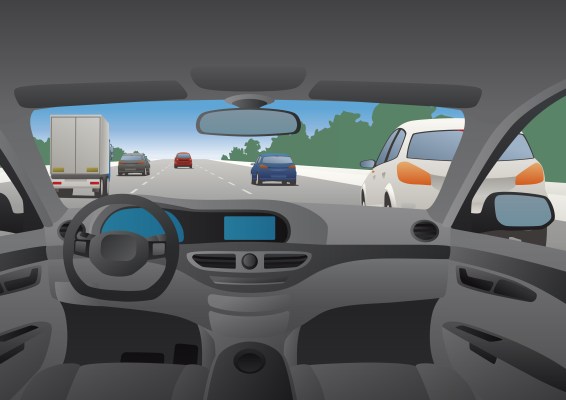On February 14, 2016, Google had its first on-road accident (with a bus). The fault lies entirely with Google, and we need to understand just how much this will impact our society. We’re about to enter a hybrid world where there will be human-controlled vehicles and algorithm-controlled vehicles on the road at the same time.
Humans are awesome; however, we are random and unpredictable, and it’s possible to imagine a future where someday we will be marked as dangerous.
With the reality of these conditions, Tesla and Google must consider regulations, infrastructure and ethics in order to achieve this hybrid reality. Here are some suggestions and recommendations as these companies embark on the journey to normalize automation on our roads.
Rough road ahead
It is not about the driverless vehicle, it is about the driverless society. One day our grandchildren may recall times when humans controlled an automobile. They will speak of us as barbarians who trusted a painted yellow line to separate combustible materials traveling at high rates of speed, only to miss each other by a matter of feet.
Even though more than 90 percent of traffic accidents are caused by driver error, it is against human nature to give up our freedom of the road. Companies must educate society about the dangers of driving and why it’s in our self-interest to let automation rule the road.
It is not intellectual property, it belongs to the people
Here is my brutal truth to the great minds of Tesla and Google: You don’t have the assets or human power to create a driverless society on your own. The software algorithms required for driverless cars will never be complete and will involve constant maintenance; therefore, you will need to move to an open data and open source community in order to achieve the goal of the driverless society.
We are already beginning to see this conundrum emerge in the auto industry. For example, Google and Fiat Chrysler recently released a self-driving car partnership, but confessed they were unsure who actually owned the driverless car data.
Arthur Taylor, CTO at Advanced Telematic Systems, recently made an argument in favor of open sourcing self-driving car code, saying it will remove the barriers to entry for innovators in the mobility space. Economics will be the biggest bottleneck initially, as we fear giving up free will to algorithms.
No matter how prepared we are there will be failures, crashes and fatalities.
The way forward is to embrace failures by releasing data and the algorithms to the open source community so that a collection of minds can build this future. These algorithms are going to make life-altering decisions for humans. Some will be life-and-death decisions; therefore, we all must contribute and be accountable and consider the ethics at stake.
This is huge! Do you get the scale?
Lawyers, start your engines. Google, your shareholders will demand indemnification. A driverless society will transform our culture, infrastructure, legislature, security, asset ownership and economy. No more used car salesmen, dealerships or repair shops.
Transportation as a service is an excellent idea; it is Uber without humans. Can I get a premium vehicle? What if I want to take the slow, scenic route? If I want to get somewhere faster is it more expensive? Self-driving vehicles as-a-service will elevate the shared economy to a new level. Will I need to own a car? Who will be in the car before me? Who is going to clean it? (Have you been in a public restroom lately? Yikes!) The driverless society will prompt many pop-up goods and services to cater to this new lifestyle.
Start small and monetize
Funding this effort will require monetization of the technology as it is created. We are already seeing this in new car features coming out every year. I like the fact that we have brake assist, backup assist and self-parking cars.
Tesla just launched its first edition of its driver-assisted products and it is incredible. This is the right approach, but nowhere near the vision for a driverless society.
How about leveling up the automation? For example, we all drive to our appointments and are frustrated when we can’t find a parking spot. I can’t wait for the day that I pull up to the location of my appointment and I don’t look for a parking spot. Instead, I pull up to the front door. I tell my car to park. It rolls away and I have no clue nor care where it goes. It found a parking spot. When I am done with my appointment I recall my vehicle and it finds me.
Go public, and embrace the fail
No matter how prepared we are there will be failures, crashes and fatalities. The wrong approach would be to hide the crashes from society. These crashes need to be investigated and made public through the media. We must embrace failure and learn to accept failure.
To that end, we must put on the public Internet the data about the accidents so it can be analyzed, reproduced, tested and constantly improved. We will need an NTSB-like open source community to govern this initiative going forward. This is not your intellectual property. The lives you are impacting are not just your shareholders.
It’s about safety
I am a capitalist and a believer in corporations and intellectual property rights. However, in this area I am torn with my own rationalization of the future of a driverless world. I will probably not live long enough to see a driverless society, as I believe the feat to be bigger than a few impressive corporations.
Don’t get me wrong, I want you to succeed! Society needs you to succeed. I have lost many friends to automobile accidents and have been in a serious one myself. If an algorithm had been in control, these people may be alive today. What you are doing is critical to our society. Please think differently and not with greed or ego.
